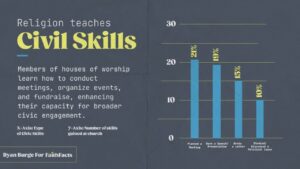Many religious institutions often function as more than just places of worship.
They are also hubs for community engagement, where individuals participate in various activities that require structure, organization, and leadership.
Attending regular meetings, volunteering at events, or helping to coordinate charitable efforts all provide hands-on experience in important areas like public speaking, decision-making, and conflict resolution.
A study by Paul Jube and Chris Gilbert, titled “The Resourceful Believer,” found that regular participation in religious activities significantly enhances the development of civic skills.
What makes this particularly interesting is the impact on individuals from different socio-economic backgrounds. Their research revealed that religious participation has a greater effect on civic skill development for those at the lower end of the socio-economic spectrum compared to those at the higher end.
Religion, in ways we may not always recognize, provides us with a range of invaluable civic skills that transcend the spiritual realm and seep into our daily lives, workplaces, and communities.
From church meetings to volunteer efforts and fundraising events, these experiences foster essential competencies that prepare individuals for both the professional world and civic life, making us better citizens and workers.
